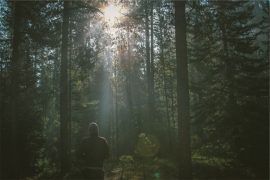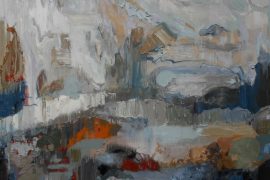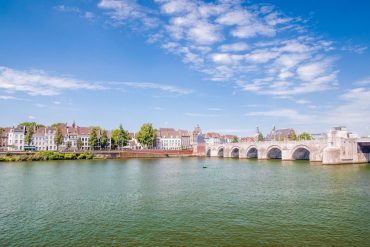We continue in our exploration of Psalm 104.
[openquote]You cause the grass to grow for the cattle,
and plants for people to use,
to bring forth food from the earth,
and wine to gladden the human heart,
oil to make the face shine,
and bread to strengthen the human heart.
The trees of the Lord are watered abundantly,
the cedars of Lebanon that he planted.
In them the birds build their nests;
the stork has its home in the fir trees.
The high mountains are for the wild goats;
the rocks are a refuge for the coneys.
You have made the moon to mark the seasons;
the sun knows its time for setting.
You make darkness, and it is night,
when all the animals of the forest come creeping out.
The young lions roar for their prey,
seeking their food from God.
When the sun rises, they withdraw
and lie down in their dens.
People go out to their work
and to their labor until the evening.[closequote]
Psalm 104:14-23
An interesting twist is revealed in v. 16, where the Psalmist uses the term “the trees of the LORD.” Throughout the Old Testament, this is the only place where this phrase is used. More often, one can find the phrase “people of the LORD” (which occurs 13 times in the Old Testament). Yet, in this verse it is as though the Psalmist is asserting that all creation, here represented by the trees, belongs to the LORD; “It is not that people are unimportant or that we do not belong. We do, but our place is within the creation-encompassing community of trees and birds and wild animals and creeping things.”[ref]McCann, J Clinton, Jr. 2012. “Between text and sermon: Psalm 104.” Interpretation 66, no. 1: 67-69. ATLA Religion Database with ATLASerials, EBSCOhost (accessed November 14, 2014), p. 68.[/ref] Humanity is merely one among a great multitude when it comes to God’s great creative works.
If there is anywhere in the text that indicates the uniqueness of human beings it is here in vs.14-15. While the livestock is simply given grass to eat, humans are given plants to cultivate, to work, to serve and tend in order that they may produce bread to eat. Wine, oil, and bread (v. 15) make up the “triad of so-called basic foods in the Near East,”[ref]Hossfeld and Zenger Psalms 3: A Commentary on Psalms 101-150 Fortress Press 2011 Minneapolis, MN, 53.[/ref] denoting the fulfillment of all human needs through God’s gracious provision. But while this certainly demonstrates the intimate care of God for human beings, it also shows their fragility, reflecting back on the language and “anthropology of dust”[ref]Ibid., p. 58.[/ref] in Psalm 103; other creatures merely require grass, human beings are tasked with bringing forth their own bread, wine, and oil. Even so, through God’s provision, it is clear that humans have a meaningful place within God’s Kingdom of creation, albeit a place of service and creativity, not of dominance.
It is interesting that while human beings are depicted as vegetarians in this text (again, reflecting back to Genesis 1), there is still an acknowledgement of the violence of predators in creation with mention of the “young lions” in v.21. God is not stingy in providing for God’s creatures; each has its basic needs met. Water, food, and also shelter, as indicated in v.17 with both the birds and the storks making their home among the trees, v.18 with the mountain goats and rock badgers, v. 22 with the young lions and their dens, and the implied home that humans go “out from” to work in v. 23. In each of these verses one sees God’s care for all of creation; like in other things, humans are not unique in receiving dwelling places to live.
Questions & Actions
- “Humanity is merely one among a great multitude when it comes to God’s great creative works.” Take a moment today to prayerfully reflect on this.
- The diet outlined in this Psalm is a simple, even spartan, one compared with the miriad of options we are presented with in our modern food system. Bread, oil, and wine. Yet even these simple staples are the result not just of natural processes, but of civilization itself. Cultivation, pressing, baking, fermentation. At each step humanity is partner to natural processes–working in concert. The result, in a freshly baked loaf, delicate olive oil, and carefully crafted wine, is a symphony. Stop today and appreciate this symphony, the great complexity of creation and humanity which it takes to produce such humble items. Get the freshest loaf of bread you can (even bake it yourself), some olive oil, and some wine (or your favorite beverage of choice). Make a meal of it an reread this section of the Psalm as a prayer. Take the time to ‘chew’ on v. 15 in particular.





